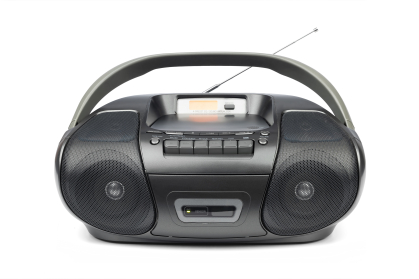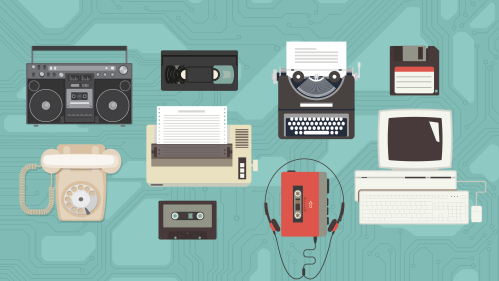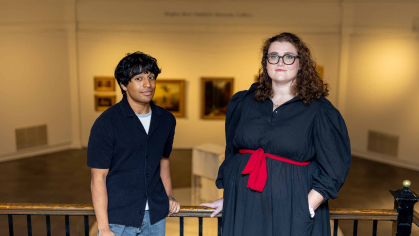Ever wonder what tech Rutgers faculty and staff brought with them to college? As today's students pack PlayStation 5s, Roku TVs, and VR headsets, let’s take a nostalgic trip back to a time of Sony Walkmans and Smith-Corona typewriters.
Before There Were Laptops

In the Fall of 1960, a long time ago, I left my home in rural Virginia to start my college career at Yale in New Haven, Connecticut. I brought with me my Royal Vintage Manual Typewriter. Even though my prep school did not teach typing, my father told me that it was an important skill for the future, so he enrolled me in the local public high school during the summer for typing instruction. I am glad my father was so insistent. It is a skill that has stayed with me as the typewriter gave way to the computer.
– Angus Gillespie, professor in the Department of American Studies, School of Arts and Sciences, Rutgers-New Brunswick
Remembering the Boombox

When I left home in California to come to the East Coast for college in 1997, I brought a boombox for my dorm (and lots of tapes and CDs) and a desktop computer that had an extremely cumbersome monitor, as this was before flatscreens, and a heavy CPU unit that sat under the desk.
By the time I was a senior in college, Apple had come out with a new idea, and I took out a student loan to buy the all-new iMac, a cute and colorful computer that all fit together on top of the desk. For exercise/walking, I had my Sony Discman and eventually got an iPod Nano (red, with a white navigation wheel), though that might have been right after college.
There were early cell phones at this time, and my mother had tried to get me one to make me take it to college, but I knew what that was. An electronic leash! I refused.
– Shauna Shames, associate professor of political science, Camden College of Arts and Sciences, Rutgers-Camden
When Adding and Dropping Classes Was Done on Paper

I attended Rutgers College from 1975 to 1979. When I graduated, I was considered technologically savvy because I had an electric typewriter that used a cartridge instead of a ribbon. I was able to press a button and pop it out without getting ink all over my hands.
Our music came from component stereo systems with four-foot-high speakers, a turntable on which we played records (vinyl) at either 33 1/3 or 45 RPM, and FM radio. We received our mail in our Rutgers Post Office boxes located in the recently torn-down Records Hall. I lived in Frelinghuysen Hall, and we had pay phones on each end of the hallway that served every student on that side. We did not have a landline phone in our rooms. We watched TV on analog, over-the-air sets with rabbit ears antennas.
Finally, we signed up for classes by hand. If I wanted to drop or add a class my first year, I had to fill out an add/drop slip, get it signed by the department for which I wanted to add the course, signed by the department for which I wanted to drop the course, and get it signed by the Rutgers College Dean’s Office. I then had to get on a bus and ride up to the Administrative Services Building on the Busch campus to get it approved. If in the 30-45 minutes the course filled, I had to go through the entire process all over again.
Steven Miller, professor of professional practice and director of undergraduate journalism and media studies, School of Communication and Information, Rutgers-New Brunswick
When the Residence Halls Had Pay Phones

Senior year at Rutgers College, 1993 – what a different time! Moving into the river dorms, I had everything a college senior could need. My mom, in her infinite wisdom, handed me a bag of quarters. Not for laundry, but for the pay phone. Yes, the pay phone! Conveniently, it was located on the opposite end of the floor, because nothing says “stay connected” like a long walk down the hall.
Armed with quarters, Aussie Spray Sprunch, and senior-year optimism, I stepped into my dorm room. I didn’t even use half the quarters!
– Gina Marcello, associate teaching professor of journalism and media studies, School of Communication and Information, Rutgers-New Brunswick
Two Pieces of Tech on This Packing List

So…51 years ago, in 1973, I left for Rutgers with two “pieces of tech”: a Sears electric typewriter and a RadioShack tape recorder. That was the sum total of my tech, plus a slide rule, as calculators were in their infancy and too expensive at the time. Plus, many professors did not allow them!
– Mark Robson, Distinguished Professor in the department of Plant Biology, School of Environmental and Biological Sciences, Rutgers-New Brunswick
A Skill AI Can't Duplicate

The transition from the typewriter to the earliest computer/word processors was an interesting time during my Ph.D. pursuit. Although the typewriter was being phased out in the 1980s, it took me a bit longer to make the switch because I had invested so much time and energy into perfecting my typewriter skills. I could take the typewriter apart and put it back together again; this was always an effort to become the master of unsticking typewriter keys and courier font type bars (this was considered high-tech, and I am quite sure AI could not deal with this phenom).
It is hard to believe any of our papers, reports, book proposals, articles, theses, and dissertations were ever completed and completed on time. Being a typewriter master was just as important as any research discovery that I made, and it got me to where I am today!
– Kevin Lyons, associate professor of professional practice, Rutgers Business School, Rutgers-Newark



